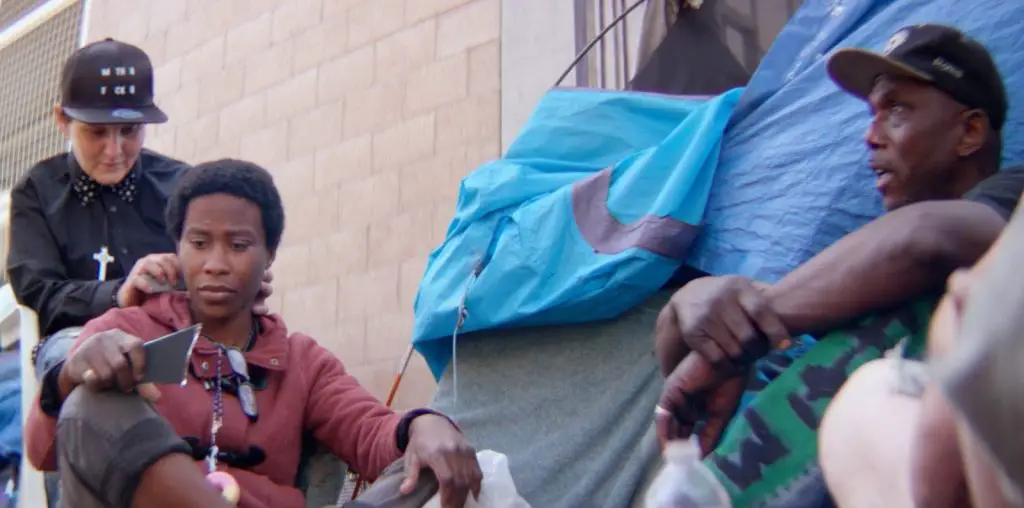
“I’m not angry sister. I’m f*****g desperate.”
It’s pretty hard not to be fascinated by the Beatle’s Hamburg, Germany period. Lore would have it that it was sort of a wild, untamed boot camp that eventually forged a bunch of kids into a Rock and Roll band. It must have been a great time to have grown up in England. You’d get cool Rock and Roll records from the docks and, if you were smart but a screw up, you got to go to art school.
Personally, I’m always wondering exactly how much bass Stuart Sutcliffe really knew how to play. I always wonder the same thing about Sid Vicious too but it’s a lot easier to imagine the Sex Pistol’s music without bass than the Beatles. Don’t get me wrong; playing bass to the ’50s classics in this movie is by no means brain surgery, but on the soundtrack it is played by the estimable Mike Mills of REM and sounds pretty amazing. So was Stu a competent bass player, like it appears here, or did he know how to play nothing at all, as some would suggest? Was Paul McCartney playing the bass lines to cover up his incompetence or did the music really suffer? The film shows some neat tension between John and Paul over the subject, but they paint it more as a case of Paul’s irritation at Sutcliffe’s less serious musical attitude than sheer outright incompetence.
Probably more interesting to everyone else in the world is how perfectly this film brings Astrid Kirchherr’s beautiful classic pictures of the period to life. Sutcliffe probably didn’t care too much about his musical acumen with a bass, but he definitely knew how cool he looked holding one. The Sutcliffe story is this wonderful lost legend, and it’s interesting because the guy was maybe better looking than anyone else in the band, talented enough to support claims that he might have been a brilliant artist, and John Lennon’s best friend and closest confidant. I’ve even seen people argue that Sutcliffe was the coolest member of the group. His only mistake was in thinking he had enough time to live to enable him a couple years of artistic slumming with the Beatles.
The actors and the script do a great job of imagining John and Stu’s cleverly vicious and arty byplay, and it’s even more entertaining to hear them do it while they’re shagging the finest girls on the strip. Everyone in this movie looks just like they did in real life and it’s pretty hard not to be enraptured by the Beatles amid a bunch of strip joints doing as much speed as they could to stay awake, all the while forming the basis for the greatest catalog and legend in pop music’s history. 1979’s Birth of the Beatles tackled a similar story, but it concentrated more on the band and whitewashed the whole story a tad. “Backbeat” dwells on Lennon and Sutcliffe and is likely as dingy and wonderful as the real thing. Occasionally Backbeat gets a little too clever and throws in phrases from “A Hard Day’s Night,” but to its credit it piles naked women into almost every other scene in the movie, sometimes they’re even covered in paint.
The music, done here by a group of grunge all-stars, doesn’t even attempt to sound dead-on, but remains mostly true to the raucous spirit of the time. “Backbeat”‘s main weakness is perhaps that it’s much more interested in the groups’ hard side than their soft, melodic side. This made it perfect for the Nirvana-dominated year it came out, but ignores a huge part of the group’s joyful friendliness. To the movie makers’ credit, they would argue that the group was forced to hide that side in the hard-bitten, thug dominated city of Hamburg, but I’ve heard recordings of the band doing “Red Sails in the Sunset” and “‘Til There Was You” from that period so it must have been there somewhere.
I never did make it through “The Hours and the Times,” the arty imagining of Lennon’s potentially homosexual lost weekend with Brian Epstein although I should probably try again some time. Ian Hart plays Lennon in both and does an admirable job of bringing to life one of the more ornery hard-bitten, driven romantics of all time. Most of the time, Hart’s Lennon seems to be singing as if his entire life depended on it. “Backbeat” understands how Lennon could feel both insecure and better than everyone else at the same time. This time he is part of a lover’s triangle as the third wheel in the Sutcliffe-Kirchherr romance. Is John more desperate for Astrid’s love or Stu’s? You decide. Nevertheless, for a guy who had as many women as John Lennon did, everyone sure seems desperate to see him as having homosexual leanings. In the end, “Backbeat” is the arty telling of the story. It’s just as interested in the German existential art movement as it is in the Beatles. Paul McCartney, for one, probably would like to sue to have himself reposited into the story of his own life, as much as everyone respects Paul’s music, and his spirit. All the hard-core Rock and Roll wannabes choose John Lennon every time. Danger: Accents may be hard sledding for novices, but you get to see where the haircuts came from.
[ Songs Include: Good Golly Miss Molly, Long Tall Sally, Rock and Roll Music, My Bonnie, Twist and Shout, Slow Down, and Roadrunner. ]
